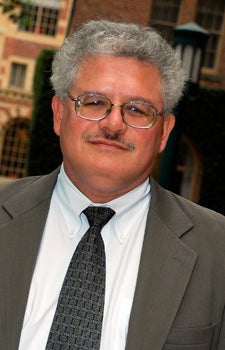Latino Americans on PBS
At the start of the Great Depression, Amelia Casteñada’s father lost his job as a stonemason and her family struggled. She had just celebrated her First Holy Communion when her mother died of tuberculosis in 1934. Her family had to drag a hysterical child from her mother’s funeral.
“What is happening to us?” she recalled thinking as a child.
Then came the knock at the door. Born in the United States and living in Boyle Heights, Calif., Casteñada was forced to relocate to Mexico, along with her brother and father, the latter who originated from Durango. She was among as many as 500,000 Mexicans and Mexican Americans sent to Mexico against their will during the 1930s anti-immigrant campaign.
“By 1931, Herbert Hoover began looking for scapegoats,” said George Sanchez, professor of American studies and ethnicity, and history, and dean of diversity and strategic initiatives at USC Dornsife. “They simply got rid of Mexicans to free up work for everybody else. There has been a pattern in the U.S. of wanting Mexican labor when it’s needed, then forcing them to leave when the labor is no longer needed.”
Casteñada’s story and Sanchez’s expertise is part of Latino Americans, the first major documentary series for television to chronicle the rich and varied history and experiences of Latinos, who have helped shape the U.S. over the last 500-some years. With a population of more than 50 million, Latinos are the nation’s largest minority group.
The six-hour documentary series, which includes interviews with nearly 100 Latinos, premieres on PBS Sept. 17 and 24 and Oct. 1. There are two, one-hour episodes shown each day. Sanchez is featured most prominently during the first two episodes.
The series chronicles Latinos in the U.S. from the 16th century to current day. Using compelling interviews and rare photos, the documentary tells the story of the Latino people, politics and culture from 1565 when Saint Augustine brought the first European settlement to the U.S. introducing Catholicism and Spanish in Florida, to 2011 when Georgia enacted its own version of Arizona’s SB-1070. The bill enables police to hand over to immigration anyone stopped without a driver’s license or proof of residency.
The series arrives during National Hispanic Heritage Month that takes place Sept. 15 to Oct. 15.
The documentary covers the years in-between, for example 1846 when Mexico and the U.S. go to war over disputed territory — to Mexico surrendering in 1848 — to current times when Latinos make up about one-sixth of the U.S. population.

The six-hour documentary series Latino Americans premieres on PBS Sept. 17 and 24 and Oct. 1. There are two, one-hour episodes shown each day. George Sanchez is featured most prominently during the first two episodes. Photo by Alexandra Bissonnette.
“The nice thing about this series is that it is the first comprehensive documentary ever on Latinos’ entire history,” Sanchez said. “It was an honor and a privilege to be asked to participate. One of my fundamental beliefs is that as an American historian with a specialization in Latino history, it is my obligation to reach out and inform the wider American public regarding the centrality of Latino history to the U.S. experience, both in the present and in the distant past.
“This PBS series gave me the opportunity to do just that.”